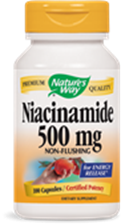|
Niacin, also known as vitamin B3, is one of the B-complex group of vitamins. It plays an important role in the conversion of carbohydrates, fats, and protein to energy. |

|
|


|
Dietary Supplement Nature's Way Premium Quality · For Energy Release* Certified Potency Niacinamide is the non-flushing form of niacin (vitamin B3). It is necessary for normal breakdown of fats and the release of energy from carbohydrates.*
*This statement has been evaluated by the Food and Drug Administration. This product is not intended to diagnose, treat, cure or prevent any disease.
Take 1 capsule daily, preferably with food.
Nutrition Facts Serving size: 1 Capsule Servings per container: 100
Amount per serving: Niacin (B3) 500mg % Daily Value: 2500* (not established)
Double safety sealed with a printed outer shrink-wrap film and a printed inner bottle freshness seal. Do not use if either seal is broken or missing. Keep out of reach of children.
This product does not contain· artificial ingredients · corn · lactose · milk · preservatives · soy · sugar · wheat · yeast
Other IngredientsGelatin (capsule), Cellulose, Magnesium stearate
©2011 Nature's Way Products, Inc. |
|
The following doses have been studied in scientific research: (Medline Plus) · For high cholesterol: The effects of niacin are dose-dependent. The biggest increases in HDL and decreases in triglycerides occur at 1200-1500 mg/day. Niacin’s greatest effects on LDL occur at 2000-3000 mg/day. · To prevent heart disease in people with high cholesterol: Niacin 4 grams daily. · For preventing and treating vitamin B3 deficiency: Doses of nicotinic acid and niacinamide are considered equivalent. For mild vitamin B3 deficiency, niacin or niacinamide 50-100 mg per day is used. For pellagra in adults, niacin or niacinamide 300-500 mg daily is given in divided doses. For pellagra in children, niacin or niacinamide 100-300 mg daily is given in divided doses. For Hartnup disease, niacin or niacinamide 50-200 mg daily. · For reducing fluid loss caused by cholera toxin: Niacin 2 grams daily. · To prevent type 1 diabetes in high-risk children: Sustained-release niacinamide 1.2 grams/m˛ (body surface area) per day. · To slow disease progression of newly diagnosed type 1 diabetes: Niacinamide 25 mg/kg daily. · For treating osteoarthritis: Niacinamide 3 grams per day in divided doses. · For reduced risk of cataracts: A daily dietary intake of approximately 44 mg of niacin. · For preventing Alzheimer’s disease: 17-45 mg of niacin from food and multivitamins. Food sources high in niacin include meat, fish, beans, nuts, coffee, and fortified grains and cereals. Note that there is no reliable evidence that taking a stand-alone niacin supplement will help to prevent Alzheimer’s disease. · For more information: http://www.nlm.nih.gov/medlineplus/druginfo/natural/924.html
|